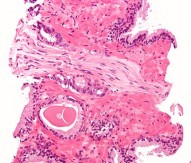
H2020 backs liver disease breakthrough
The UK’s University of Brighton is sharing in a €5.9m Horizon 2020 grant to support the development of a new treatment for chronic liver disease as part of a European consortium led by University College London.
The University of Brighton’s School of Pharmacy and Biomolecular Sciences will receive funding of nearly £190,000 (~€260,000) for laboratory work to assist with trials of a new and safe nanoporous carbon that acts in the gut to reduce the entrance of bacterial products into the blood that exacerbate liver injury.
The EU research project, entitled ‘Clinical evaluation of carbons of controlled porosity as a new therapeutic for the treatment of liver cirrhosis and non-alcoholic fatty liver disease’, or CARBALIVE, is a Research and Innovation Action and involves partners in Spain, Italy, Portugal, Switzerland and France.
Commenting, Dr Susan Sandeman of the University of Brighton said: “In cirrhosis, current therapy to prevent recurrent complications of advanced cirrhosis is to use poorly-absorbed antibiotics. But long term antibiotic therapy has problems associated with bacterial resistance and this can prove costly.
“We will be part of a consortium investigating the safety and efficacy of this novel nanoporous carbon in patients with liver disease and developing an innovative and cost-effective strategy for disease management.”
Cirrhosis of the liver affects 29 million Europeans and claims 170,000 lives every year, while costing the EU almost €16bn. Changes in the bacteria that populate the gut in patients with liver disease make the condition worse and leads to a range of additional health complications. Current treatments include the use of antibiotics to kill the gut bacteria, but the long term use of these drugs can result in antibiotic resistance and can be very costly.




